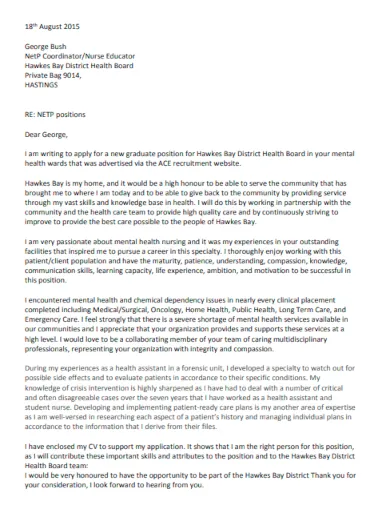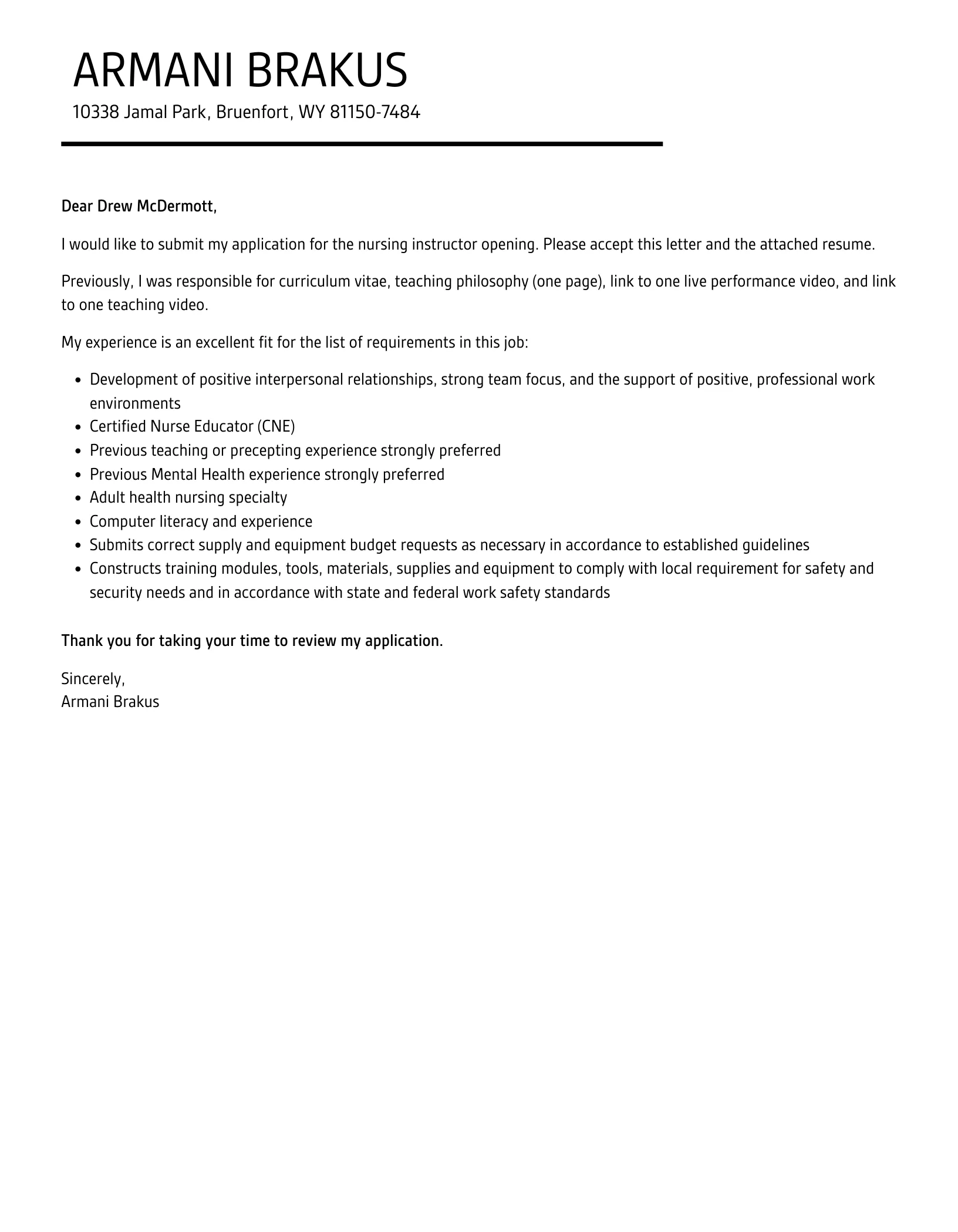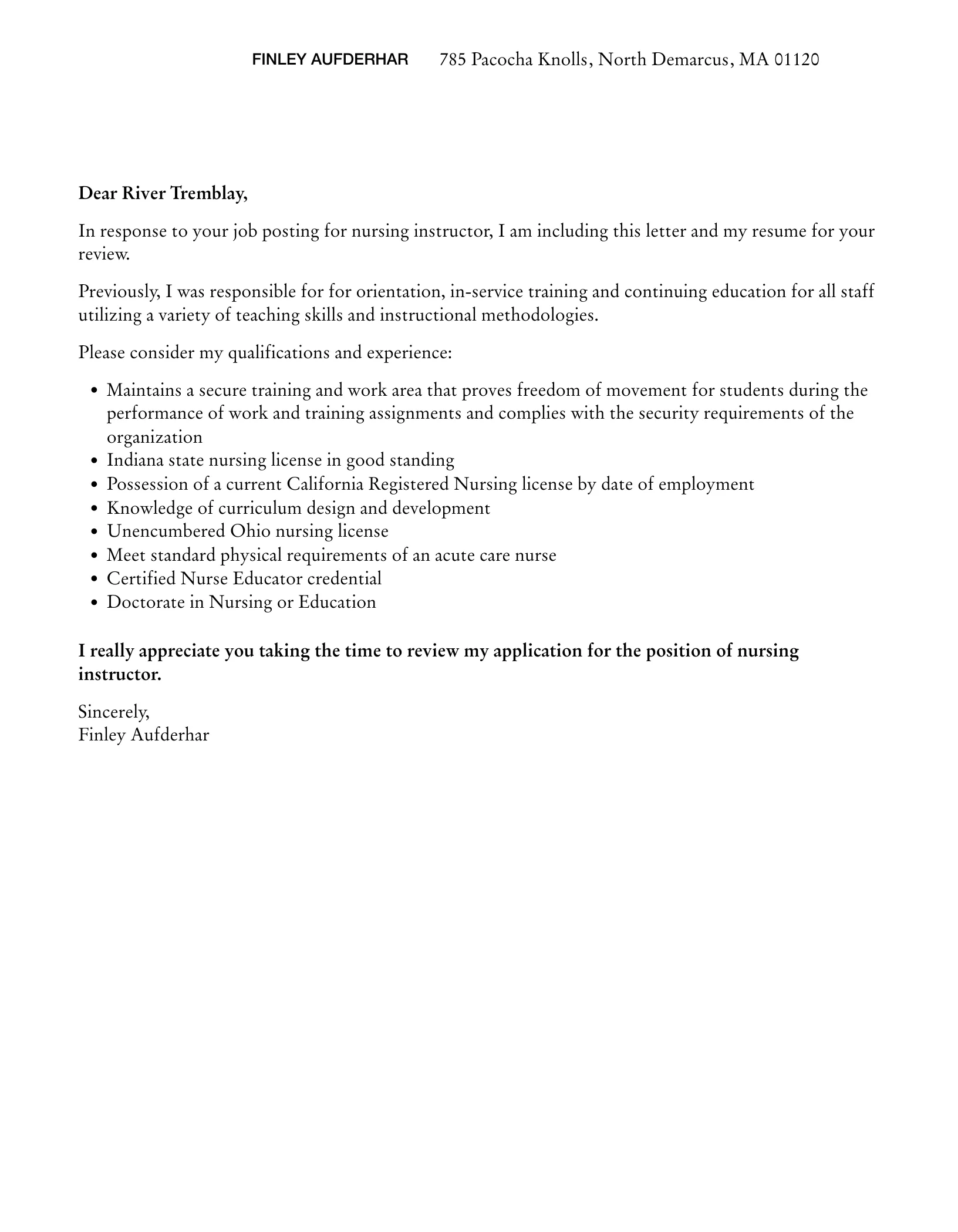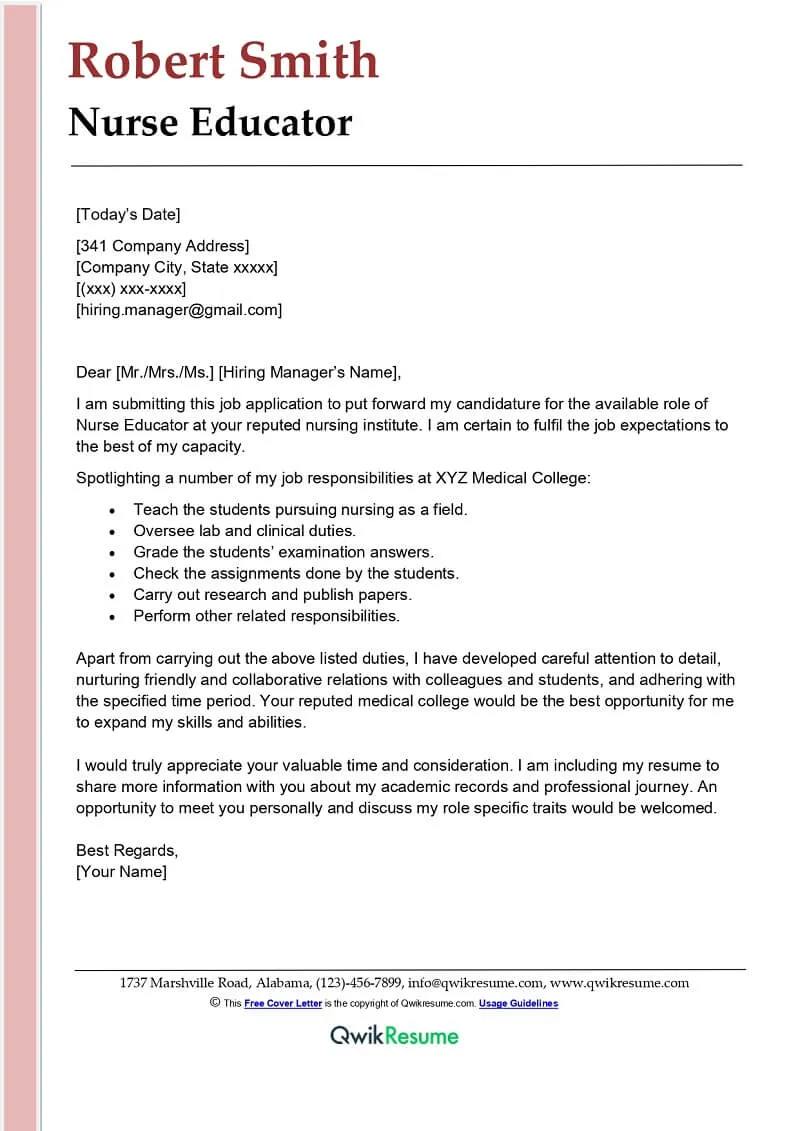Highlighting Your Nursing Instructor Skills
Crafting a compelling cover letter is crucial when applying for a nursing instructor position. It’s your first opportunity to make a strong impression and demonstrate why you’re the ideal candidate. The cover letter is not simply a reiteration of your resume; it’s a dynamic document that showcases your skills, experience, and passion for nursing education. Begin by highlighting your core nursing instructor skills. These include clinical expertise, curriculum development, teaching methodologies, and student assessment proficiency. Showcasing these skills upfront establishes your credibility and signals to the hiring committee that you possess the necessary qualifications to excel in the role. Use action verbs and specific examples to illustrate how you’ve applied these skills in previous roles.
Showcasing Relevant Experience
Detailing your relevant experience is another critical component of a successful cover letter. Focus on experiences that directly align with the responsibilities of a nursing instructor. This may include experience in clinical settings, previous teaching roles, mentorship programs, or any involvement in nursing education initiatives. Provide concrete examples of your accomplishments and responsibilities in each role. This will give the hiring committee a clearer picture of your capabilities and suitability for the position. Emphasize your ability to translate clinical knowledge into effective teaching strategies. Additionally, mention any experience with curriculum development, student assessment, or educational technology, as these are increasingly important in modern nursing education.
Tailoring Your Letter to the Job

A generic cover letter simply won’t do. Tailor each cover letter to the specific nursing instructor position you’re applying for. Carefully review the job description and identify the key requirements and desired qualifications. Then, customize your letter to address these specific needs. Use keywords and phrases from the job posting to demonstrate your understanding of the role and your ability to meet the employer’s expectations. By tailoring your letter, you show the hiring committee that you’ve taken the time to understand their needs and are genuinely interested in the position.
Researching the Institution
Before you start writing, research the institution. Understanding the institution’s mission, values, and educational approach will help you demonstrate how you can contribute to their goals. Visit the institution’s website, read about their nursing program, and learn about their faculty and students. Incorporate this information into your cover letter to show that you’re not only qualified but also a good fit for their culture. Mention any specific programs or initiatives that align with your interests and skills. This personalized approach will make your cover letter stand out.
Emphasizing Achievements
Don’t just list your responsibilities; emphasize your achievements. Instead of saying you ’taught students’, describe how you ‘improved student performance’ or ‘increased pass rates on licensing exams’. Use the STAR method (Situation, Task, Action, Result) to structure your examples and highlight your accomplishments. Quantify your achievements whenever possible, using numbers and data to illustrate your impact. This will provide tangible evidence of your abilities and effectiveness. Highlighting your achievements sets you apart from other applicants and proves that you can make a positive contribution to the nursing program. This will help demonstrate that you can make a positive impact on student learning and program success.
Quantifying Your Accomplishments

When describing your achievements, use numbers and data to quantify your accomplishments. For example, instead of saying you ‘improved student success’, state that you ‘increased student pass rates by 15%’. Providing specific metrics will give the hiring committee a clear understanding of your impact and effectiveness. Quantifiable results are far more compelling than vague statements. They demonstrate your ability to achieve measurable results and contribute to the success of the nursing program. Consider including metrics such as student satisfaction scores, retention rates, or improvements in clinical performance.
Demonstrating Passion and Commitment
Your cover letter should reflect your passion for nursing education. Express your enthusiasm for teaching and your commitment to helping students succeed. Share why you’re drawn to the nursing instructor role and what motivates you. Highlight your desire to contribute to the development of future nurses. Demonstrating your passion will make your cover letter more engaging and memorable. It will show the hiring committee that you’re not just looking for a job, but that you’re genuinely invested in the field of nursing education. Mentioning any specific initiatives or teaching philosophies that resonate with you can further illustrate your enthusiasm.
Expressing Enthusiasm
Throughout your cover letter, express your enthusiasm for the nursing instructor position and the institution you’re applying to. Let your passion for nursing education shine through. Convey your eagerness to contribute to the nursing program and support student success. A genuine expression of enthusiasm will make your cover letter more memorable. This can be as simple as stating your excitement about the opportunity or mentioning specific aspects of the program that you find particularly appealing. Demonstrating enthusiasm shows that you are not only qualified but also genuinely motivated to make a positive impact.
Showcasing Communication Skills

Effective communication is critical for a nursing instructor. Make sure your cover letter is clear, concise, and well-written. Use proper grammar, spelling, and punctuation. Proofread your letter carefully before submitting it. Tailor your writing style to the tone of the institution, ensuring it reflects professionalism. Clear and effective communication is essential for the nursing instructor role, where you will be imparting knowledge to students. A well-written cover letter can directly showcase your ability to communicate complex information in an understandable way.
In conclusion, crafting a compelling cover letter for a nursing instructor position requires careful attention to detail and strategic self-presentation. By highlighting your skills and experience, tailoring your letter to each job, emphasizing your achievements, and demonstrating passion and commitment, you’ll significantly increase your chances of landing an interview. Remember to showcase your communication skills by writing a clear, concise, and well-organized letter. Follow these tips, and you’ll be well on your way to securing your dream job. Good luck with your application!
